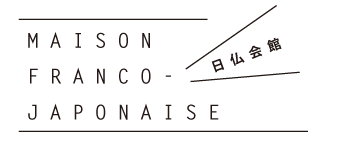septembre 2020
- Entretien avec son excellence l’ambassadeur de France au Japon, Monsieur Laurent Pic, à l’occasion de la fin de sa mission
- Japanese Economy after COVID-19
- Urban Experimentation and the Olympic Games.
The Urban Policy Innovations of Tokyo 2020 and the Consequences of the Postponement of the Games
Entretien avec son excellence l’ambassadeur de France au Japon, Monsieur Laurent Pic, à l’occasion de la fin de sa mission
en français sans traduction
| vendredi 11 septembre 2020 / 17 h 30 - 18 h 30 | |
| En ligne | |
| Laurent PIC (ambassadeur de France au Japon), Bernard THOMANN (directeur de l'IFRJ-MFJ), MIURA Nobutaka (Conseiller d'honneur de la Fondation MFJ) |
|
La Maison franco-japonaise a le plaisir de vous annoncer la mise en ligne de la vidéo de l'entretien avec Monsieur Laurent Pic, l'ambassadeur de la France au Japon, à l'occasion de la fin de sa mission.
Né le 2 août 1964 à Paris 14e Formation universitaire
Carrière
Décorations
Organisation : Fondation MFJ, IFRJ-MFJ. |
* À l'exception des séminaires fermés de recherche ou des événements exceptionnels requérant une inscription payante, l'accès aux manifestations de la MFJ est libre et gratuit. Prière de vous inscrire.
| vendredi 18 septembre 2020 / 12:30–14:00 | |
| Online | |
| HOSHI Takeo (univ. of Tokyo) |
Inscription close

The COVID-19 pandemic has shocked all the major economies including Japan. Although the number of deaths associated with COVID-19 is not as large as those in the US and many countries in Europe and the economic damage also seems to be relatively small, Japan has recorded unprecedented negative economic growth for the second quarter of 2020. The talk looks at the impacts of COVID-19 on the Japanese economy, reviews the policy responses so far, and speculates on the future of the Japanese economy. Profile: Takeo Hoshi is professor at the Graduate school of economics at University of Tokyo. Until August 2019 he was Henri and Tomoye Takahashi Senior Fellow at the Freeman Spogli Institute for International Studies (FSI), Professor of Finance (by courtesy) at the Graduate School of Business, and Director of the Japan Program at the Shorenstein Asia-Pacific Research Center (APARC), all at Stanford University. Before he joined Stanford in 2012, he was Pacific Economic Cooperation Professor in International Economic Relations at the Graduate School of International Relations and Pacific Studies (IR/PS) at University of California, San Diego (UCSD), where he conducted research and taught since 1988. Hoshi is also Visiting Scholar at the Tokyo Center for Economic Research (TCER), and Senior Fellow at the Asian Bureau of Finance and Economic Research (ABFER). His main research interest includes corporate finance, banking, monetary policy and the Japanese economy. Moderator: Adrienne SALA (FRIJ-MFJ) This event will be held on Zoom. For more information on how to join, please visit: https://youtu.be/hIkCmbvAHQQ |
* À l'exception des séminaires fermés de recherche ou des événements exceptionnels requérant une inscription payante, l'accès aux manifestations de la MFJ est libre et gratuit. Prière de vous inscrire.
Urban Experimentation and the Olympic Games.
The Urban Policy Innovations of Tokyo 2020 and the Consequences of the Postponement of the Games
en anglais sans traduction
| jeudi 24 septembre 2020 / 18:00–20:00 | |
| Online | |
| Alexandre FAURE (EHESS) |
|
The Olympic Games of Tokyo 2020 (now 2021), could it be an urban laboratory for transport experiments? The Games of 1964 have a very positive image in the Japanese imagination. The Japanese government had shown its technological skills by building the Shinkansen and the major urban highways of Tokyo. The 2020 edition is much less ambitious in terms of construction: renovation of the 1964 venues, reconstruction of the Olympic stadium, construction of the Olympic village and the media centre. These last elements are located on the bay of Tokyo, in the waterfront district at the heart of the urban renaissance policies promoted by successive governments since the 2000s.
Profile: Moderator: Adrienne SALA (IFRJ-MFJ) |
* À l'exception des séminaires fermés de recherche ou des événements exceptionnels requérant une inscription payante, l'accès aux manifestations de la MFJ est libre et gratuit. Prière de vous inscrire.
Agenda du Bureau Français > septembre 2020















